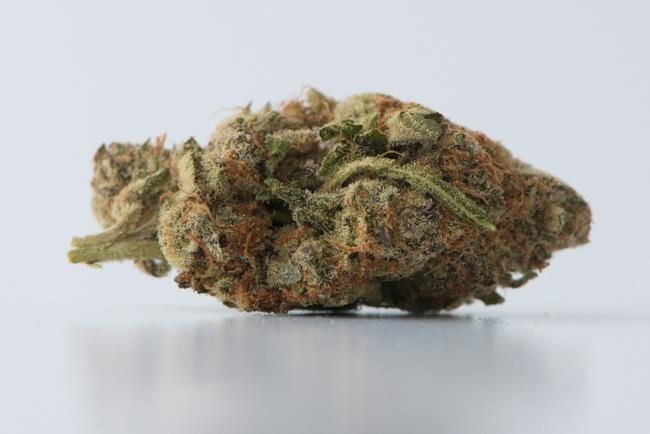
Medical marijuana is shown in Toronto, Nov. 5, 2017. An internal audit outlining significant problems with Ottawa's administration of hundreds of millions of dollars in medical marijuana for veterans is being met with shock and concern by mental-health providers and others.THE CANADIAN PRESS/Graeme Roy
Republished September 15, 2022 - 2:00 PM
Original Publication Date September 15, 2022 - 10:16 AM
OTTAWA - Mental-health providers and others are reacting with shock and concern after an internal government audit uncovered significant problems with Ottawa's administration of hundreds of millions of dollars in medical marijuana for veterans.
The audit results are also spurring calls for more research into the potential benefits and risks of medical cannabis, as well as greater oversight of how the drug is administered to protect at-risk veterans and taxpayer dollars.
“I think it’s clear from this report that the current landscape of medical marijuana for veterans is not the best that it can be, not anywhere near it,” said Oliver Thorne, executive director of the B.C.-based Veterans Transition Network.
“We don’t want the Wild West. And to some degree, this report seems to indicate that that’s currently the state of affairs.”
The Canadian Press first reported on the results of the audit this week, which found Veterans Affairs Canada has all but lost control as requests for reimbursement for medical marijuana from injured veterans increase significantly.
The federal government, which first started covering the costs of veterans’ weed in 2008, reimbursed over 18,000 veterans for their medical pot in the last fiscal year — an increase of 3,000 from the previous year and more than twice as many as 2017-18.
Costs have been growing even faster as individual veterans request more and more weed. Ottawa shelled out $153 million last year, three times what it paid in 2017-18, and estimates it will pay out $200 million this year and $300 million in 2025-26.
It was against this backdrop that auditors identified a number of serious gaps and shortcomings in Veterans Affairs’ management of the program, including only a handful of medical practitioners having written 40 per cent of all authorizations for veterans.
One-third of forms submitted to Veterans Affairs and reviewed by auditors were also found to be missing key information but nonetheless approved, while the department’s actual requirements and direction for eligibility were found to be severely lacking.
Jason Busse, associate director of the Michael G. DeGroote Centre for Medicinal Cannabis Research at McMaster University, one of the few researchers in Canada studying cannabis use by veterans, described those findings and others as “shocking.”
“It kind of validated my worst fears,” he said. “To see some of these projections, to see some of the limits of the current information, with some of these stark numbers, was extremely surprising.”
While Busse has previously called for more research into the potential medical benefits and risks of marijuana use by veterans, he said the government’s failure to track and monitor its own data around authorizations and usage is troubling.
That includes an apparent failure to look into why only 11 medical professionals were responsible for authorizing 40 per cent of veterans’ requests for access to medical cannabis.
Even so, Busse warned against any “over-correction” that would make it impossible for veterans to access medical marijuana, citing a need for better oversight as well as research to help Ottawa set the right checks and balances.
Thorne, whose organization works with veterans struggling with psychological trauma and post-military life, was quick to note that many injured ex-soldiers are adamant that medical marijuana has helped them.
He also noted several limitations to the audit, including the fact it does not look at how medical marijuana fits into veterans’ overall treatment, which can include other medications as well as counselling and therapy.
Yet the fact many former service members are asking for more cannabis each year as they renew their prescriptions, rather than less, is a red flag for Thorne, as the purpose of treatment should be to help veterans address and resolve their trauma.
“That then raises the question of, how effective is this for whatever they may be seeking it for?” he said. “To me, it does not look like a very viable long-term strategy if they are requiring more and more over time.”
Wounded Warriors executive director Scott Maxwell said some veterans struggling with psychological trauma have reported they might never have attended his organization’s various programs if they didn’t have access to medical marijuana.
That is despite warnings from Health Canada and the College of Family Physicians of Canada about the potential negative impact of marijuana use by individuals suffering from mental-health conditions, particularly post-traumatic stress disorder.
“Tools like that are things that have helped get people into programs like ours,” Maxwell said. “They have told us, many of them, that they wouldn’t have been able to do this based on how they were living previously.”
But Maxwell also noted that even as the federal government spends more on medical marijuana for veterans, it is providing only a fraction of that amount to organizations like his that provide peer-support services and other assistance.
Wounded Warriors and the Veterans Transition Network are among about three dozen organizations receiving federal support from a special fund whose annual $3-million budget was temporarily increased last year to $8 million per year for three years.
While that federal support is welcome, “it’s not enough,” Maxwell said, adding Wounded Warriors relies on about $40 million in donations to run most of its programs.
This report by The Canadian Press was first published Sept. 15, 2022.
News from © The Canadian Press, 2022